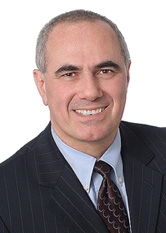Introducing Decarbonize NYC - July 2025

News, thoughts and tools to guide property owners and managers, lenders, developers and
sustainability professionals in their pursuit of a greener New York City.
Dear Reader,
Welcome to Decarbonize NYC, a monthly newsletter that gathers in one place articles, news and ideas to help New York City achieve its ambitious decarbonization goals without sacrificing economic growth.
We hope this newsletter will spark a dialog with you and welcome any questions, thoughts or concerns you may have.
Looking forward to hearing from you,
Michael Clain, Shanni Lynch and Kathrine H. K. Pedersen
Where Do the Mayoral Candidates Stand on Local Law 97?
What is Local Law 97? - In New York City, buildings are responsible for over 70% of greenhouse gas (GHG) emissions. Enacted in 2019 as part of the Climate Mobilization Act, Local Law 97 (LL97) addresses energy use in buildings larger than 25,000 square feet, which requires building owners to meet stringent carbon reduction targets over time.
The goal of LL97 is to reduce emissions from New York’s largest buildings by 40% by 2030 and to achieve net-zero emissions by 2050. Building owners are held accountable for their building’s annual carbon emissions. LL97 establishes significant fines for buildings that exceed their emissions limit – up to $268 per metric ton of CO2 equivalent over the assigned limit. For more information on LL97, visit the DOB’s LL97 Website.
Reporting Deadlines & Extension Options - Building owners are required to submit an annual emissions report to demonstrate compliance. While annual reporting requirements formally begin in May 2025, the NYC Department of Buildings (DOB) introduced a limited grace period and extension options to give building owners more flexibility to comply without penalty. On June 16, DOB issued a Service Notice allowing building owners to request an extension for submitting their compliance report. The new deadline is December 30, 2025, provided the extension request is received by August 29. For further details on the LL97 extension and the reporting process, visit the DOB's Service Notice.
Where do the 2025 NYC Mayoral Candidates Stand on LL97? - As the November 5, 2025 mayoral election approaches, here's how the leading candidates position themselves on Local Law 97 enforcement:
- Eric Adams (Incumbent, running as an Independent) - Mayor Adams has expressed support for the goals of LL97 and, in September 2023, launched “Getting 97 Done,” a citywide strategy aimed at helping building owners comply through technical assistance and funding coordination. His administration has promoted flexibility in implementation, including extended deadlines [link] and penalty relief for owners demonstrating “good-faith” [link] efforts toward compliance. While this approach has garnered support from some building owners, critics argue it weakens enforcement and risks undermining LL97’s impact, favoring real estate interests over climate goals [link].
- Zohran Mamdani (Democratic Nominee) - Assemblymember Mamdani is a vocal advocate for strict enforcement of LL97. He has sharply criticized the Adams administration for delaying key requirements, stating the Mayor is siding with the real estate industry instead of leading on climate action. Mamdani calls for stricter enforcement for noncompliant landlords, while also appealing for expanded support from city government to assist middle-income property owners in meeting the LL97’s requirements. [link] [link]
- Andrew Cuomo (Independent Candidate, Former Governor) - Former Governor Cuomo has indicated that, if elected, he would seek to modify Local Law 97 to reduce the financial burden on co-ops and condos. He has proposed directing the DOB to limit penalties for co-ops actively working toward compliance.[link] As governor, Cuomo’s 2021 budget proposal included a controversial provision to allow building owners to meet emissions limits by purchasing renewable energy credits from upstate New York solar and wind farms. Critics argued that this would create a loophole, weakening LL97’s original purpose by allowing emissions to continue in NYC without on-site improvements.[link]
Takeaway - Local Law 97 is a bold and necessary response to addressing NYC’s climate crisis, but its future hinges on enforcement, financing, and political will. With key reporting deadlines looming and a mayoral election around the corner, now is the time for stakeholders to stay informed, prepared, and engaged.
Court Upholds NYC's Local Law 97 in Landmark Decision
On May 22, 2025, the New York State Court of Appeals issued a landmark ruling in Glen Oaks Village Owners, Inc. v. City of New York, upholding the validity of LL97 and rejecting claims that it was preempted by the state's Climate Leadership and Community Protection Act (CLCPA). Filed in 2022, the lawsuit was brought by representatives of residential buildings subject to LL97’s emissions requirements, who argued that the state had fully preempted local regulation of greenhouse gas emissions. The Court's decision effectively concludes the challenge to LL97, allowing the City to proceed with its decarbonization efforts in line with LL97 ambitious goals.
Local Law 97: Fines Over Retrofits
In the Green Economy report from the Center for an Urban Future, highlighted in Habitat Magazine, revealed that many building owners plan to pay fines, currently set at $268 per ton of CO₂ above a property’s emissions limit, rather than investing in retrofits required by Local Law 97. While fewer than 11% of covered buildings are currently non-compliant, emissions targets are set to increase by 2030, and the cost of retrofits is projected to significantly exceed the current fine structure. Policy experts suggest that the city must either increase fines or provide financial assistance and incentives, like grants or tax breaks, to encourage compliance. The Real Estate Board of New York opposes harsher penalties, calling the law “an ill‑conceived poorly implemented law,” arguing that fines don’t fund decarbonization. For more information on the report, please visit NYC future.
Some City Council members are working on bills to tighten the law, for example, by eliminating energy‑credit offsets, forcing more landlords to decarbonize directly.
Intro 772 Has Lost Traction
Habitat Magazine reports that, Intro 772, a bill introduced in 2024 to ease Local Law 97 requirements for co-ops and condos, has stalled in the City Council despite gaining 22 co-sponsors. The bill sought to raise emission caps by counting green space as part of building square footage and to reduce penalties for smaller buildings. However, it has not received a hearing, and with Local Law 97 already in effect and emissions reports due, momentum has faded.
Environmental groups and city officials strongly oppose the bill, arguing it would undermine climate goals. Officials including Council Speaker Adrienne Adams and Environmental Commissioner Rohit Aggarwala have rejected it outright. With no progress at the city level and past failures at the state level, the bill appears dead, and stricter emissions limits coming in 2030 remain on track.
Contact
If you would like to share thoughts about this topic, please contact Michael J. Clain, Partner, Shanni C. Lynch, Associate, or Kathrine H. K. Pedersen, Law Clerk.
Disclaimers
In some jurisdictions, this material may be deemed as attorney advertising. Past results do not guarantee future outcomes. Possession of this material does not constitute an attorney/client relationship. This information is provided for your convenience and does not constitute legal advice. It is prepared for the general information of our clients and other interested persons and it may include links to websites other than the Windels Marx website. This information should not be acted upon in any particular situation without first consulting with an attorney and obtaining legal advice based on your specific facts and circumstances.

